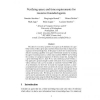Free Online Productivity Tools
i2Speak
i2Symbol
i2OCR
iTex2Img
iWeb2Print
iWeb2Shot
i2Type
iPdf2Split
iPdf2Merge
i2Bopomofo
i2Arabic
i2Style
i2Image
i2PDF
iLatex2Rtf
Sci2ools
ATAL
2006
Springer
2006
Springer
Verifying space and time requirements for resource-bounded agents
The effective reasoning capability of an agent can be defined as its capability to infer, within a given space and time bound, facts that are logical consequences of its knowledge base. In this paper we show how to determine the effective reasoning capability of an agent with limited memory by encoding the agent's reasoning system as a finite state machine (FSM) and verifying the existence of a program (sequence of inference steps) that, starting from a given knowledge base K, leads to a state satisfying a given formula . Our approach is general enough to admit verification of any reasoning agent whose inference rules can be encoded as transitions between FSM states. As an illustration, we show how to encode two example reasoners: a classical propositional reasoner which can derive all classical consequences of its knowledge base given unlimited memory, and a forward-chaining rule-based reasoner of the kind found in many applications employing ontological reasoning and business...
Related Content
| Added | 20 Aug 2010 |
| Updated | 20 Aug 2010 |
| Type | Conference |
| Year | 2006 |
| Where | ATAL |
| Authors | Natasha Alechina, Mark Jago, Piergiorgio Bertoli, Brian Logan, Chiara Ghidini, Luciano Serafini |
Comments (0)

